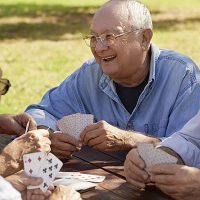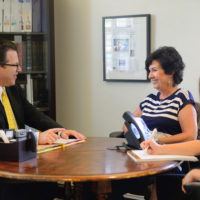South Florida Grass-roots Group Pushes For Guardianship Reform
Dr. Robert Sarhan watched in a court as his mother, Yvonne, pleaded a decade ago with a Miami-Dade probate judge to name him as her guardian.
After all, he was a doctor with the U.S. Bureau of Prisons and a beloved son. Who better to take care of his mother?
But citing discord between Sarhan and his brother, Circuit Judge D. Bruce Levy appointed a professional guardian. An attorney was brought into the case, and the attorney brought in scores of other professionals, including around-the-clock nurses and maids, Sarhan said.
“All of the sudden my mother was treated like an invalid, but she wasn’t. She was fully competent,” he said. “This is the modus operandi: isolate, medicate and then steal from the estate.”
Attorney Robert L. Moore of Miami said he has assisted Sarhan and others pro bono in fighting unjust guardianships.
“I think Florida has a real big problem on it’s hands, and I am not sure if the state really knows what to do,” Moore said.
“There is clearly an effort or movement afoot of those who have had loved ones taken away from them and their inheritance squandered by predatory, shark-like attorneys who see this as a legitimate form of business.”
Yvonne Sarhan died in 2010 after her son spent every cent he had fighting to retain guardianship. Dr. Sarhan has since joined about a dozen other South Floridians who say it’s time for the Florida Legislature to step in and update guardianship laws.
‘No Oversight’
The group of emotionally drained people with guardianship complaints is motivated but frightened.
One woman in this group appeared on a Miami radio show in May to tell her story about how a guardianship did not provide one cent for her mothers care while attorneys charged hundreds of thousands of dollars in fees to her mother’s account.
She is lobbying lawmakers in Florida and Washington but does not want her name published after she asserted she received threats from guardians and their lawyers that it would be wise to remain silent.
“There is no oversight in this area of the law. Meanwhile, more people require guardianships on an annual basis,” she wrote in a letter to the U.S. House, “Instead of the elderly being protected, they are being subjected to humiliating and degrading treatment whereby their funds are used to first pay attorneys involved in their cases.”
She is proposing reforms to Florida Statute 744, the state guardianship law, that would include a court monitoring system for guardians to prevent looting, a cap on attorney fees, a new standard for finding a person incapacitated and placing lay people on The Florida Bar Probate Rules Committee.
Members of the group have similar stories. Some say their loved ones set up living trusts indicating who they want to take care of them only to have their plans erased with a stroke of a judge’s pen.
State Senator Gwen Margolis, D-Miami, has taken an interest in the issue.
“I have heard some horror stories about people who lose their rights to be with or take care of their parents once a guardian gets involved,” Margolis said.
“While I believe that most guardians do a good job, some abuses by some guardians need to be stopped. I am interested in looking at legislation that will protect the rights of all involved in the guardianship process.”
Defenders of the current system say judges often don’t appoint relatives as guardians for good reasons.
Michelle Hollister is an elder law attorney in Delray Beach and president of the National Guardianship Association. She also served under Governors Jeb Bush and Charlie Crist as head of the Statewide Guardianship Office. She said Florida already allows judges to monitor estates as a safeguard against looting and every bill is scrutinized by probate judges.
‘Ahead of the game’
“In Florida we are actually ahead of the game when it comes to guardianships,” she said. “Other states look to Florida for guidance.”
She said three professionals often determine if seniors should be placed into guardianships, while in other states its up to a probate judge who may have no expertise in assessing mental capacity.
Hollister, a partner at Solkoff Legal, acknowledged change could be coming. U.S. Senator Amy Klobuchar, D-Minnesota, is pushing a bill that would authorize grants for courts to update their guardianship practices.
Moore joined the cause after working as a guardian ad litem to get his law license reinstated. He spent nine months in federal prison after being charged with money laundering for a drug trafficking client in the mid-1990’s.
In another probate case, he said a man in Palm Beach County found heirlooms and other valuables being taken out of his house to pay for expenses afer a guardian was appointed for his mother. The guardian didn’t know Moore’s client lived there.
He said such actions by guardians may be permissible to pay bills, but that doesn’t make them right. “While it may be statutorily authorized, it is morally bankrupt.”
But Palm Beach County, though, has not shied away from scrutinizing guardians. Now in its second year, the Clerk & Comptroller’s Guardianship Fraud Program has resulted in two arrests and turned up more than $2.7 million in questionable expenses and missing assets.
Clerk & Comptroller Sharon Bock said the threat of prosecution is key to keep guardians above the board.
In order to create a deterrent against future fraud, you need to have law enforcement willing to take on these cases after the initial audit by the Clerk’s Inspector General, and you need to have prosecutors willing to bring charges against perpetrators,” she said.
Moore’s client, Sarhan, has been beating the drum against the guardianship system for several years, saying attorneys and guardians work the system, the judges rubber stamp their requests. He also said he discovered the attorney representing his mother also represented the guardian in other cases.
“Not one single document was submitted on behalf of my mother’s wishes,” he said. “Guardians are given this opportunity, and they make all this money. She was exploited. There is a pattern here.”
He maintains the guardianship contributed to his mothers death. He said a doctor prescribed Seroquel for insomnia even though the drug carries a black box warning not to give it to elderly patients with dementia.
As far as Sarhan is concerned, the money was gone and his mother was expendable.
Calls for comment to the guardian at the time of Yvonne’s Sarhan’s death were not returned by deadline, and her attorney died.
Those pressing for change recall what happened to renowned Overtown artist Pervus Young. With his work in the Smithsonian Institution, friends were stunned in 2010 when there wasnt enough money for his funeral. young, who had a kidney transplant in 2007, had been placed under guardianship after his former manager got him declared incompetent.
When he died in a nursing home at 67, Young’s estate was bankrupt.
Hollister, though, said it may sound sensationalistic to make Young a poster child for guardianship reform.
“It makes good headline,” he said. “But if he was in a nursing home in South Florida, room and board could run up to $7,000 a month. One illness can wipe somebody out and, if they are in a guardianship, it generally means there is something there that garners attention.”











